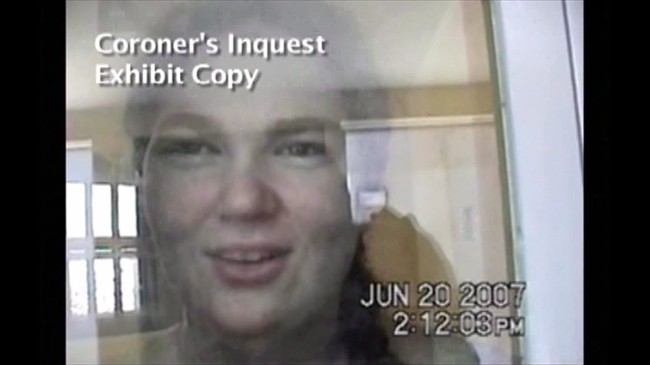OTTAWA – The Correctional Service of Canada spent at least $5 million on “legal and administrative costs” during the Ashley Smith inquest, according to internal government documents obtained by Global News.

The Ontario coroner’s inquest – which was repeatedly delayed and took more than three years to complete – initially faced resistance from federal government lawyers, who initially tried to block disturbing videos of the teenage inmate and to limit the inquest’s scope.
“It’s outrageous,” said Kim Pate, a prison advocate who knew Smith.
“Indefensible acts are being defended at the taxpayers’ expense instead of people just taking responsibility and being held accountable, and attempting to at the very least spend even a fraction of that money trying to ensure that this never happens again,” said Pate, a lawyer who serves as executive director of the Canadian Association of Elizabeth Fry Societies.
In the fall of 2012, Prime Minister Stephen Harper criticized correctional authorities, calling their conduct “completely unacceptable.” His government later said it ordered CSC to cooperate with the inquest.
Smith was 19 when she choked herself to death in a Kitchener, Ont. prison cell in 2007, as guards acting on orders stood outside her cell and watched. The teen spent 11 months in federal custody in prisons across Canada, serving a majority of her time in isolation.
READ MORE: Ashley Smith’s family calls for reopened criminal investigation in her death
The inquest concluded last December, when the jury ruled Smith’s death a homicide. There were more than 100 recommendations, including that seriously mentally ill female offenders not be held in prisons.
It is likely the government spent even more money on the case: the $5 million figure is included in a Public Safety policy document written in July 2013, four months before the inquest wrapped.
“To date, Correctional Service of Canada’s legal and administrative costs in support of the inquest are approximately $5 million,” says the document, obtained under access to information law.
“Correctional Service of Canada has advised that they have little capacity to absorb extensive costs associated with the inquest.”
Neither CSC nor the department of public safety responded to questions about how much the government spent on the inquest after July, or for a breakdown of the cost.
NDP public safety critic Randall Garrison said the CSC likely increased its own costs by “trying to frustrate” the inquest at its opening stages.
But more importantly, he said the government has yet to act on recommendations from a 2008 correctional investigator’s report on Smith’s death. Recommendations included an independent adjudication of segregation for mentally ill inmates, and for CSC to review all cases of long-term segregation where mental health issues were a contributing factor.
“We still haven’t seen Corrections Canada implement the recommendations from 2008 that could prevent tragedies like this in the future,” said Garrison. “So we run the risk of having further tragedies leading to inquests.”
READ MORE: Key recommendations from the jury
Liberal public safety critic Wayne Easter says he believes CSC could have reduced the cost by fully cooperating from the start.
“If they had come forward without fighting every step of the way there is absolutely no question it’d had been cheaper. No question about that,” he said.
But he said he finds it “remarkably strange” that department of justice lawyers would be fighting on the government’s behalf without the government knowing or ordering it.
“There’s something missing here,” said Easter. “If the prime minister ordered (CSC) to provide the information yet the department of justice under the authority of the minister of justice was fighting the case, the two don’t match.”
The document also states a “high proportion” of male and female offenders, at 13 per cent and 29 per cent respectively, are identified with mental health issues upon admission to the federal prison system.
And it acknowledges the CSC cannot deal with the problem.
“While providing for adequate mental health services for inmates falls within the Correctional Service of Canada’s legislated mandate, the Service is not equipped to provide adequate treatment for offenders with complex mental health needs,” it says.
– with files from The Canadian Press



Comments